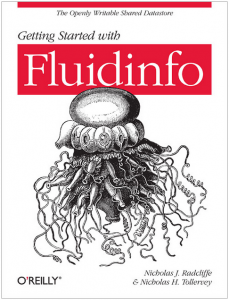 I’m talking at the Association for Geographic Information (AGI) conference next week in Stratford-upon-Avon, birthplace of Shakespeare. The talk is at 14:30 on Sept 23rd in the geoweb stream, organized by Christopher Osborne. Christopher writes (and I am shameless enough to excerpt):
I’m talking at the Association for Geographic Information (AGI) conference next week in Stratford-upon-Avon, birthplace of Shakespeare. The talk is at 14:30 on Sept 23rd in the geoweb stream, organized by Christopher Osborne. Christopher writes (and I am shameless enough to excerpt):
In the geoweb stream we have Terry Jones talking about the just released FluidDB, the database with the heart of a wiki, which looks like it might just be *the next big thing* on the internet. I was lucky enough to host him talk at #geomob in January, an attention grabbing speaker working on some amazing technology. Worth the ticket price alone.
I was also asked to join a panel on privacy and to submit a few paragraphs outlining a position for panel background. Below is what I submitted.
The area in which I may be able to contribute is in data storage. Each time you use an application (and of course sometimes when you’re not – e.g., just carrying your phone down the street in your pocket), you’re generating information. I’m always curious to know where that information winds up. Who owns it? Can I change it, delete it, share it, hide it from certain people, search on it, sell it? Most of those questions have not really been addressed in modern times – by which I mean since we started to use devices that are connected to networks, that use online storage etc. Gone (almost) are the days when you could have a truly private interaction with a piece of technology (a radio, a car, etc).
I don’t think there’s any clear conclusion here, yet. There are lots of tradeoffs involved – many people are willing – even happy – to give up huge amounts of information in exchange for some upside. But there’s a slowly growing awareness of what’s going on, and there are advances in tying information together server-side and these will enter the public consciousness over time. Physical location can tie a lot of things together, so I do think there’s something special about location in particular. Similarly, when using the web there’s a (URL) sense of location, and cookies are designed around that. Location ties things together on the web, with profound (at least in the economic sense) impact. We’re likely to see a similar thing, because everyone has a phone just like everyone has a web browser – only more so.
My particular expertise (to the extent that I have any) is in FluidDB, which we launched last month. FluidDB has an interesting model of information control. While its objects are not owned (you can think of them as concepts if you like), their pieces are. There’s a permissions model at the level of the tag (objects are made of tags). That means that a user can have their lat/long on an object in FluidDB and use the permissions model to control who can read it. Or you could have 2 sets of lat/long pairs, with different degrees of accuracy for different sets of friends or acquaintances.
FluidDB changes things for the application programmer. In the old world, the programmer was used to owning (or at least controlling) all data. When you write an application using FluidDB, you have a choice – you can let the user own some/all of the information the program is managing. That’s interesting because for the first time, I think, programmers are going to be faced with an explicit choice about who should own information. They have the ability to put the control into the hands of their users. (And the user can then be charged for the storage too.) If a user not only owns but controls their own data, they can do what they like with it. The answer to all my questions above (Can I change it, delete it, share it, hide it from certain people, search on it, sell it?) becomes Yes.
So, can we use FluidDB and storage architectures of a similar nature to move at least in part towards a world in which normal consumers have more control over their data? I think the answer is a qualified yes. Qualified because most users still don’t give a hoot, and because there are lots of tradeoffs, as mentioned above, the use of FluidDB being just one of them.
I hope that helps. I’ll try to stay away from generalities – feel free to stop me if I don’t. BTW, I’m very interested in the recent thinking of Jeff Jonas. See his latest blog post. I imagine you’ll find it highly relevant. He’ll be in London just after the AGI conf, on the 26th. Too bad, he’d have been an excellent panelist – apart from being a true expert he’s also highly entertaining!
If you’re going to the AGI conference, please say hi.
 Getting Started With Fluidinfo is now available in hardcopy and various eBook formats from O’Reilly. The authors, Nicholas Radcliffe (@njr) and Nicholas Tollervey (@ntoll), know Fluidinfo inside out, as you might hope. They’ve written multiple Fluidinfo client libraries, web applications, command line tools, visualizations, have written many blog posts about Fluidinfo, have imported tons of data into the system, and have both contributed to the design and architecture in many ways. The books is extremely well written. Both of the Nicholases are entertaining and clear writers.
Getting Started With Fluidinfo is now available in hardcopy and various eBook formats from O’Reilly. The authors, Nicholas Radcliffe (@njr) and Nicholas Tollervey (@ntoll), know Fluidinfo inside out, as you might hope. They’ve written multiple Fluidinfo client libraries, web applications, command line tools, visualizations, have written many blog posts about Fluidinfo, have imported tons of data into the system, and have both contributed to the design and architecture in many ways. The books is extremely well written. Both of the Nicholases are entertaining and clear writers.





